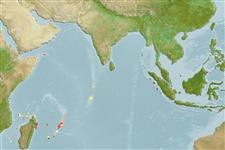>
Ovalentaria/misc (Various families in series Ovalentaria) >
Pseudochromidae (Dottybacks) > Anisochrominae
Etymology: Anisochromis: Greek, anisos = unequal + Greek, chromis = a marine fish without identification, dealing with perch; cited by Plinius (Ref. 45335).
Environment: milieu / climate zone / depth range / distribution range
Ecología
marino asociado a arrecife; rango de profundidad 0 - 11 m (Ref. 42958). Tropical
Distribución
Países | Áreas FAO | Ecosistemas | Ocurrencias, apariciones | Point map | Introducciones | Faunafri
Western Indian Ocean: Saint Brandon's Shoals.
Tamaño / Peso / Age
Maturity: Lm ? range ? - ? cm
Max length : 2.8 cm SL macho / no sexado; (Ref. 42958)
Short description
Claves de identificación | Morfología | Morfometría
Espinas dorsales (total) : 1; Radios blandos dorsales (total) : 25 - 27; Espinas anales: 1; Radios blandos anales: 17 - 19. Dorsal fin of males generally dusky when preserved, the large dark spot absent on anterior part of fin. Caudal vertebrae, 23-25 (usually 24). Anterior lateral line scales 32-39, usually 33-37. Posterior interorbital pores 1-2; total parietal pores 14-30, usually more than 30 (Ref. 42958).
Apparently living in corals with surfaces composed of tiny finger-like projections (Ref. 42958).
Life cycle and mating behavior
Maturities | Reproducción | Spawnings | Egg(s) | Fecundities | Larva
Bi-directional sex change has been proposed for this species though histological analysis of more specimens is needed for confirmation (Ref. 103751).
Gill, A.C. and R. Fricke, 2001. Revision of the Western Indian ocean fish subfamily Anisochrominae (Perciformes, Pseudochromidae). Bull. Nat. Hist. Mus. Lond. (Zool.) 67(2):191-207. (Ref. 42958)
IUCN Red List Status (Ref. 130435)
Threat to humans
Harmless
Human uses
Herramientas
Special reports
Download XML
Fuentes de Internet
Estimates based on models
Preferred temperature (Ref.
123201): 26.3 - 28.4, mean 27.5 °C (based on 141 cells).
Phylogenetic diversity index (Ref.
82804): PD
50 = 0.6250 [Uniqueness, from 0.5 = low to 2.0 = high].
Bayesian length-weight: a=0.01000 (0.00244 - 0.04107), b=3.04 (2.81 - 3.27), in cm total length, based on all LWR estimates for this body shape (Ref.
93245).
Nivel trófico (Ref.
69278): 3.6 ±0.58 se; based on food items.
Fishing Vulnerability (Ref.
59153): Low vulnerability (10 of 100).
